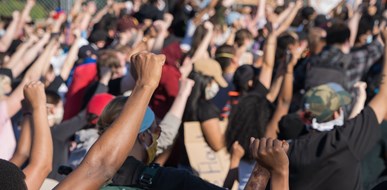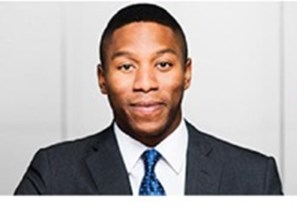[Interview] International lawyer Nawi Ukabiala: 'Use international norms and dispute settlement to promote racial justice in the US'
Published 15 July 2020By Dimitri van den Meerssche

©Shutterstock, protesters raise their hands in solidarity outside of the Fifth Police Precinct in Minneapolis, Minnesota in response to the death of George Floyd
Across the globe, social movements have been mobilising for racial justice and equality after the brutal killings of George Floyd and Ahmaud Arbery in the United States. Asser researcher Dimitri Van Den Meerssche interviewed international lawyer Nawi Ukabiala on his vision for the role of international law in the fight against racial violence in the US. Ukabiala recently wrote an article in which he called for US civil society to appeal to the international community to invoke international human rights treaties. In this interview he says that "human rights lawyers should encourage their governments to use the dispute settlement mechanisms in those treaties to try to dismantle the system piece by piece."
How can we think about the history of racial injustice in the United States from the perspective of international law?
"One cannot genuinely understand how racial injustice in the United States today implicates international human rights law, without understanding the history of racial injustice in the United States. The US was founded on the principles of life, liberty, and the state-enforced exploitation of black people for capital gain. Legal historians tend to omit that last principle and so lawyers tend to forget how resilient it is.
Around the turn of the 19th century, Toussaint Louverture led the slave rebellion that established Haiti, which became the first state to abolish slavery. Shortly thereafter, Britain launched a practice of incorporating the prohibition on the slave trade into conventional international law. Decades later, in 1856, the US Supreme Court infamously upheld the institution of slavery, stating that blacks were “so far inferior, that they had no rights which the white man was bound to respect.” So, when the prohibition on slavery was emerging in international law, the legal institution of slavery was still a fixture in American society, and it was enforced with the utmost brutality.
However, exploitation in the form of slavery could not withstand the changes that were afoot, including in international law. So, it magically transformed. Slavery was succeeded by a network of racial discrimination laws and customs, commonly known as ‘Jim Crow'. Jim Crow was also inherently exploitative; and it was also enforced with the utmost brutality. However, the Jim Crow system could not survive the great human rights movement of the mid-20th century, of which racial equality was a fundamental component. That system of exploitation permutated into the form we find it in today. Today, the US has a system of targeted enforcement of criminal laws against blacks, often for petty or non-existent offenses, and again, often with the utmost brutality. So, racism in America and international law run on parallel evolutionary tracks."
Which international legal norms do you consider to be violated by the killing of George Floyd and similar manifestations of structural violence embedded in the American criminal justice system?
"Events like the killing of George Floyd clearly implicate some of the most basic human rights norms guaranteed in both conventional and general international law. Think of the prohibitions on racial discrimination, torture, and extrajudicial killing, as well as the rights to life, dignity, due process, and security of person.
What has been more difficult for the international community to grasp, however, is that these gruesome, video recorded police killings, are representative of a much broader system of racial oppression. Although we now have more statistical evidence than we did a decade ago, it still cannot capture the full extent of this phenomenon, because the phenomenon itself deters black persons from reporting human rights violations, and it conditions the authorities to ignore them."
What can be the strategic importance of international law in the current social movement against racial injustice?"
"As I said earlier, racial injustice in America and international law run on parallel evolutionary tracks. International legal norms, however, are a step ahead. So strategically, I think that American civil society should be specifically invoking international human rights standards to support their reform efforts. The UN Special Rapporteur on Racism has been laying out the case for using international law to reconceptualise what racial justice should look like in the US.
American law is not a good framework for eradicating racial injustice because, from the very beginning, it was designed to perpetuate it. For example, the judicially invented intent to discriminate standard in American law, makes it almost impossible to prove racial discrimination. It’s a preposterous standard that the seminal anti-racism treaty, the Committee on the Elimination of Racial Discrimination (the “CERD”) does not have. Civil rights lawyers have no choice but to carry the crippling burden of trying to prove intent in American courts, often by resorting to theories like “implicit bias”. They should also demand that the US abolish the intent standard because it violates a basic rule of human rights law.
The paradox is that the US was one of the chief architects of the international human rights framework, although its own domestic legal framework has so many of these shortcomings. Maybe the US promoted human rights standards - that it was far from achieving - because it wanted human rights law to serve as inspiration for itself and others to pursue a more perfect vision of justice and equality. Maybe it was because the US primarily wanted human rights law to serve as a mechanism to discredit its geopolitical rivals in the 20th century. Or maybe it was because disavowing practices of domination and exploitation was just a hollow concession that rich countries made, as part of an exchange for free trade and open markets. Whatever the reason, I think the consequence is that we now have human rights law and that it provides the framework for racial justice in the US and globally."
Do you see a productive relationship between the history of civil rights mobilisation in the US and international human rights law and practice?
"Yes, I do indeed. American civil rights leaders have developed a legacy of productive discourse with the international law community. In 1947, for instance, W.E.B. Dubois and The National Association for the Advancement of Colored People (NAACP) famously made an Appeal to the World, petitioning the UN to hold the US accountable for pervasive human rights violations against black people.
The international movement that Dr Martin Luther King helped spark was part of the impetus for the adoption of the CERD in 1965. In 1967, he explained that the American civil rights movement and issues of international humanitarian concern are “inextricably” linked. When he stood in front of the UN, Dr King reaffirmed “the principles of peace, universality, equal rights, and self-determination of people, embodied in the Charter and acclaimed by mankind, but violated by the United States.”
In response to the most recent wave of police killings, leaders in the American civil rights movement have once again appealed to the UN to hold the US to human rights standards, and in particular, those established in the CERD. And for the first time in decades, we are seeing racial injustice in the US widely discussed in the language of human rights law. So, not only is there a productive relationship between civil rights movements in the US and international human rights law, they have also evolved in a mutually supportive way."
How should international lawyers and foreign states approach racial injustice in the United States?
"Okay, let me offer three thoughts on this.
First, international lawyers and foreign states should consider the character of the international human rights norms that racial injustice in the US implicates. Rules like the prohibition on racial discrimination and torture lie at the very bedrock of the human rights system. They are jus cogens norms. They trigger the “silence is violence” principle. When they are being violated, everybody has a duty to act.
Second, international lawyers and foreign states should consider the nature of racial injustice in the US. During one of his lectures at NYU, civil rights lawyer Bryan Stevenson asked us to imagine how the world would react if Germany, with its history of the holocaust, maintained the largest system of mass incarceration in the world in which Jews were grossly overrepresented. It seems unthinkable, but that is exactly what America is doing.
Despite its history of race-based slavery, the US maintains a system of “mass incarceration” that has more people under correctional supervision than Stalin did in the Gulag and blacks are incarcerated seven times as often as whites. These black bodies are collected by the targeted enforcement of criminal laws, a practice that is inherently exploitative, using brutal and sometimes lethal force. Also, prisons in the US aren’t like the United Nations Detention Unit in The Hague. The UN Committee against Torture (CAT) has observed that the conditions that inmates are subjected to often constitute torture. Mass incarceration also hosts a system of forced labor in which inmates receive nominal compensation and are then often charged exorbitant sums to purchase basic necessities or to communicate with their families. I believe that the liberalist tradition that the US helped to pioneer is already facing immense challenges. Its defenders should ask themselves how much longer they really think it can survive this kind of hypocrisy.
Finally, I think that my first two considerations suggest that drastic action is required. All states have an obligation to cooperate to end the serious violation of jus cogens norms, even if they are occurring in the most powerful nation on the planet. That means that international lawyers and foreign states should resort to all pacific means at their disposal, including invoking the mechanisms available in the existing human rights framework for the purpose they were created."
What possibilities do you envisage for the strategic use of human rights mechanisms to combat racial injustice in the United States?
"That is a challenging question, because while international human rights norms are a step ahead of American racism, international human rights practice is a step behind. Last month, we saw the UNHRC fail to pass a resolution establishing a Commission of Inquiry to investigate racism in law enforcement against blacks in the US that the African members of the counsel proposed and the United Nations Special Rapporteur on racism called for. Instead, the High Commissioner for Human Rights will prepare a more general report about systemic racism around the world. While this is an important step, for those seeking to use human rights law to promote racial justice in the US, it is a disappointing development. Unlike the extensive findings and recommendations that characterise Commission of Inquiry reports, we can expect that the High Commissioner’s report will just contain the type of summary statements on racial injustice in the US that other UN bodies and human rights experts have made in the past.
However, it is important to remember that international dispute settlement also provides opportunities to promote racial justice in the US. For example, recently I have been trying to raise awareness about the inter-State conciliation procedures in the CERD and the CAT. These mechanisms exist for states to hold each other accountable for human rights violations.
Inter-state conciliation procedures under the CERD provide a platform to obtain extensive findings and recommendations concerning racial injustice in the US from the CERD Committee, the most authoritative anti-racism body in international relations. Adverse findings would give rise to the “name and shame” effect, which puts pressure on political leaders and courts seeking to maintain America’s image as a paragon of liberal ideals. Even if the US ignores them, they can be leveraged by domestic civil society and policymakers seeking reform.
More importantly, real power in international relations does not lie with human rights experts and UN civil servants; it lies with sovereign states. It is much harder for the US to ignore condemnations from UN experts when its sovereign equals are taking deliberate action to place its racial justice problem on the diplomatic agenda. The more that its human rights violations divert attention from its own diplomatic priorities, the bigger a problem they become for the US government.
We should remember that all the manifestations of racism we see in the US are part of a larger system of oppression and exploitation. It is important to understand that defeating any one aspect of that system will not secure racial justice. However, there are many human rights treaties. So, human rights lawyers should encourage their governments to use the dispute settlement mechanisms in those treaties to try to dismantle the system piece by piece. By persistently doing so, they can help develop human rights practice so that, like human rights law, it is a step ahead of American racial injustice."

Nawi Ukabiala is a public international lawyer and associate at Debevoise & Plimpton LLP in New York, where his practice focuses on international dispute resolution and public international law. His representations have involved human rights proceedings before the Committee on the Elimination of Racial Discrimination and the Inter-American Commission on Human Rights, third-party communications to the International Criminal Court, and business and human rights compliance. Nawi previously served as the legal officer to Judge Julia Sebutinde at the International Court of Justice in The Hague. He speaks solely in a personal capacity.

Dimitri Van Den Meerssche is a postdoctoral researcher for the Asser Institute. He is part of the research strand Dispute Settlement and Adjudication in International and European Law, which is organised around inquiry into attributes of trustworthy dispute settlement in international adjudication. It examines the many dimensions of adequate dispute settlement and explores new, alternative and interdisciplinary methods for analysing fundamental changes in international institutions and in international law. Dimitri Van Den Meerssche recently contributed to an expert consultation on race, borders and digital technologies, organised by Tendayi Achiume, the UN Special Rapporteur on contemporary forms of racism, xenophobia and related intolerance.
